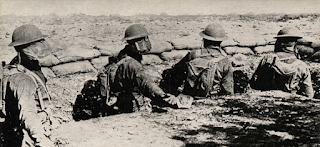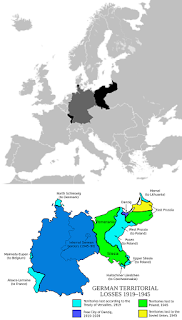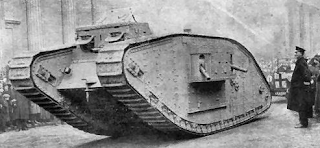since feeling is first
who pays any attention to the syntax of things
will never wholly kiss you;
wholly to be a fool
while Spring is in the world
my blood approves,
and kisses are better fate
than wisdom
lady i swear by all flowers. Don't cry
-the best gesture of my brain is less than
your eyelids' flutter which says
we are for each other: then
laugh, leaning back in my arms
for life's not a paragraph
And death i think is no parenthesis
-----
Originally published in is 5 by E. E. Cummings. Since it isn't public domain yet, you can read about half of the poems contained therein by clicking here.
-----
e.e. cummings (without capital letters as he did not like capital letters much) was born in Cambridge, Massachusetts, on October 14, 1894. He died on September 3, 1962, being the second most widely read poets in the United States after Robert Frost [read some of his poems], as great a poet and wonderful counterpart precisely because they almost represent polar opposites insofar as style, tone and thematic content.
After completing undergraduate studies and a Masters of Arts at Harvard University by 1916, Edward Estlin Cummings enlisted as a volunteer ambulance driver during World War I. Five months later, he was detained on suspicion of espionage by French authorities. The consistent and constant vitalist message in his poetry, his enduring love of life, is likely a product of having witnessed the "War to End All Wars".
Of course, the "War to End All Wars" did not end all wars and, in fact, led to an even deadlier and longer one, World War II, only two decades later. However, contrary to popular belief, World War I was far more gruesome for participants than was WWII. The reason for this is largely technological. On the one hand, airplanes were still too basic to provide any decisive advantage, and tanks only came into existence near the end of that war, invented by the English and quickly replicated by everyone else, but these were too few, clunky and slow to permit the quick troop movements seen during the Second World War.
On the other hand, the machine gun had been perfected and great strides had been made in artillery, mortars, and in chemical warfare, particularly mustard gas, against which early gas masks afforded little protection.
The result was that the First World War was largely a trench war that was basically a stalemate where troops would advance with many losses from one trench to the next only to have a counterattack drive them back from that trench to where they had come from. The use of toxic gas had two purposes: not only did it provide a cloud of cover that impeded proper aiming by machine guns, it also killed or severely injured the troops holed up in the trench that was being advanced towards.
 |
| Photograph of World War I infantrymen spending their days in trenches covered by sandbags and protected by barbed wire. |
The First World War only ended because the Allied Powers managed to successfully flank the Central Power's trench lines, cutting off their front line troops from receiving supplies. This maneuver led to a Conditional Surrender or Capitulation by the Central Powers (i.e., Germany, the Austria-Hungary Empire, Bulgaria, and the Ottoman Empire), unlike the end of World War II which was concluded in an Unconditional Surrender.
 |
| World map of the Allied Powers, the Central Powers, and their colonies, at the onset of World War I. Allies shown in green; Central Powers shown in orange, and neutral territories are displayed in gray. Russia withdrew from the war in 1917, ceding the territories the Central Powers had managed to occupy following the Bolshevik Revolution and their need to focus on internal affairs as their new state restructured. The United Socialist Soviet Republics would get back control over these territories following World War II. |
The conditions set by the Allied Powers (i.e., the British Empire, France, Italy, and Japan) split the Austria-Hungary into two separate states, spelled the end of the Ottoman Empire, but the conditions were harshest against Germany, being considered the main culprit. These included large territorial transfers, of particular importance are Alsace-Lorraine going to France and most of Western Prussia going to the establishment of the nation of Poland. However, it was the large economic reparations imposed on Germany that led to its economic collapse soon afterwards and allowed the Nazi Party's rise to power. Not surprisingly, one of Hitler's first orders of business was to violate the Treaty of Versailles via a surprise re-militarization in 1936 of the Rhineland; moreover, the German invasion of Poland on September 1939 marks the beginning of the Second World War. Allied cowardice permitted it all, and Hitler would later say "If France had then marched into Rhineland, we would have had to withdraw with our tail between our legs", a hypothetical event that would have likely prevented WWII altogether because the French army was still overwhelmingly larger and better equipped than Germany's given that the latter had just begun the rebuilding of their military strength.
 |
| Click to Enlarge. German territory at onset of World War I and the remaining territory at the end of World War II, in gray at top, in blue at bottom. The reunification of Germany did not occur until 1990, following the 1989 fall of the Berlin Wall. |
History aside, the psychological effects of the dehumanizing nature of World War I and the mass and unusually cruel deaths that were everyone to be seen had a profound influence on e.e. cummings' celebration of life, living, and the vitality in all of us that most people either hinder or ignore.
 |
| Otto Dix (1924) "Shock Troops Advance under Gas". Otto Dix participated in what is known as Germany's cultural Golden Age during the decade of the 1920s. |
----------
Read more poems by Edward Estlin Cummings.






No comments:
Post a Comment
You can check out any time you like but you can never leave